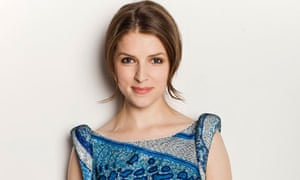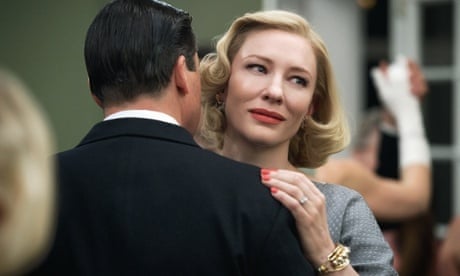 Kendrick's career has been defined by a string of strong and unorthodox characters. Photograph: Marc Royce/ Marc Royce/Corbis Outline
Kendrick's career has been defined by a string of strong and unorthodox characters. Photograph: Marc Royce/ Marc Royce/Corbis OutlineIt's a shock to find Anna Kendrick curled up in a bathrobe when I enter her hotel suite. On closer inspection, though, the 26-year-old turns out to be beneath the robe, rather than inside it. "I do have clothes on under here," she squeaks. "It's just so cold." She is perky, with subtly Manga-esque features – wide-open eyes and a tiny, expressive mouth – but she hasn't had the most relaxing morning. Whisked to Salford at bleary o'clock to appear on breakfast TV, she got stuck in traffic on the way back to London and hasn't eaten all day, hence the pizza that she begins nibbling on while we talk.
Not that Kendrick would bemoan her lot. "I'm the person who wouldn't send back my food even if I got steak when I'd ordered fish," she sighs. This could be why she is often drawn to the tenacious or hyper-confident characters in her work – the "bad asses," as she puts it. Through them she can live out fantasies of assertiveness. "It's sort of a wish-fulfilment thing, to have those moments where you can yell at people, or say 'Fuck you!' to an ex-boyfriend."

Think of her as a censorious busybody in Scott Pilgrim vs the World, or the ruthlessly ambitious debate-team captain in Rocket Science, or the corporate axe-wielder opposite George Clooney in Up in the Air, a performance which brought her nominations from every awards body from the Oscars down. She is a crisp dramatic actor with a facility for screwball, as well as a knack, best exhibited in last year's "cancer comedy" 50/50, for being adorable without lapsing into kookiness.
She has reached her largest audience in the Twilight films, where she provides zesty and necessary comic relief. But her career trademark has become that moment when her characters undergo a revelatory or disorienting change – let's call it the Kendrick kink. "Are we coining that term?" she asks. "I'm nervous about this." It's visible in much of her work, right from her first film, Camp, a proto-Glee musical in which she plays a mousey introvert who poisons another cast member before announcing: "She's fucked, I'm ready and the goddamn show must go on!" The US critic Roger Ebert captured her appeal when he said: "Kendrick can make you like her even when you shouldn't."
She resists taking too much credit. "I guess the Kendrick kink is actually a character's fatal flaw. It's really all about being very well written." Still, it is she who says "yes" to these unconventional roles when there are other, more homogenous parts she could presumably take instead. "Sure. Especially recently. God, yeah." She gives a roll of the eyes and an audible "ugh".
honest opinion of What to Expect. "What did I think? I actually liked it." The telling word here is "actually," which seems to acknowledge the incongruity of her involvement. "I was pleasantly surprised that the script was willing to deal with slightly darker emotions that come up." Although, as I point out, there is one subject that isn't broached: abortion. "Even though it isn't mentioned, I felt like it was behind that conversation the characters have – 'What do you wanna do?' 'I dunno, what do you wanna do?' Each of them is scared to bring it up." Not unlike the movie itself.
Kendrick was raised in Portland, Maine, the sort of place, she claims, where "people were literally walking around saying: 'I'm gonna get out of this town one day!'" As a child, she was distinguished by seriousness and integrity. She preferred hanging around with older people and developed an early interest in acting, persuading her parents to drive her to auditions hundreds of miles away. At one casting call for a shampoo commercial, she began to understand how different she was from her fellow pre-pubescents.
"There was a roomful of kids and they taught us this jingle which we all had to sing. I remember looking around: everyone seemed so thrilled to be singing it. Then the casting director stopped us and said, 'Anna, can you smile more please? You don't seem like you're very happy.' I wasn't so good at doing that cheesy little kid thing. At least now when I go on David Letterman, they don't have some embarrassing clip of me singing a shampoo jingle."
Her unease may come from a dislike of being singled out. At school, the other children called her "Broadway" when they saw her in the halls. It can't have helped that the local press went cock-a-hoop over her; one magazine included her in its list of the 10 Most Intriguing People in Maine when she was barely in her teens. She hoots at the memory of this. "Oh, I was very intriguing as a 13-year-old. You have no idea. I was an old soul. Did I mention that?" These days she finds it baffling when the press in her hometown want to talk to her. "They ask the same questions I've been asked 3,000 times. 'What's George Clooney like?' 'What's it like being in Twilight?' Maybe I was more intriguing when I was a kid."Musical theatre was a more natural home for her, and she found success on Broadway playing Dinah in High Society: at 12 years old, she became the third-youngest performer ever nominated for a Tony award. Todd Graff, who directed Camp, has described her as "an old soul". "I suppose it's a compliment so I should take it at face value," she says, with the rattled air of someone who intends to do no such thing. "I just never know what people mean when they say that." Wise beyond your years? "Well, there you go," she laughs. "I'd feel weird saying, 'Oh, I guess Todd means I'm wise beyond my years and I'm pretty damn great!'"
I doubt she's changed much. She certainly didn't have her head turned when she decamped to Los Angeles in her late teens to pursue her career. "Humility was an important part of the way I grew up. And I found that to be less common when I moved to California. That's not to say humble people don't exist there, but ambition seems really important. I heard people saying they were going to become millionaires by the time they were 25 – that's gross and obnoxious, but in California it's looked on as an asset." Socialising brought its own pressures. "You start to think it's important to go to nightclubs. It's urgent, almost, that you do it, because there's magic inside! Then you get in and there isn't. But you don't learn your lesson. I found it all so weird. You know, someone would tell the door guy that I was Ashley Olsen's best friend, just so we could get into some club I didn't want to go to anyway."
Her revulsion at superficiality in general, and celebrity culture in particular, is comprehensive. She has witnessed the effect fame has had on her Twilight co-stars ("Sure, they're wealthy, but they're basically in a prison"). And she has experienced the shock of seeing paparazzi photographs of herself and her partner, the British film-maker Edgar Wright (who directed her in Scott Pilgrim), taken without their knowledge: "I started crying immediately. It was like someone emailing a picture of you sleeping. It felt scary and dangerous. It still does. I try to ignore it."
Fortunately, there is one small upside to fame. "People send you stuff if you say you're interested in something," she says. "I have a tonne of body lotion. So I could mention I was interested in, you know, surfing, and some company would send me a surfboard." Forget surfboards. Let's put the word out that she is into intelligent, unorthodox screenplays. Yes, that's it. Someone send Anna Kendrick some decent scripts pronto.
• What to Expect When You're Expecting is on general release.

0 comments:
Post a Comment